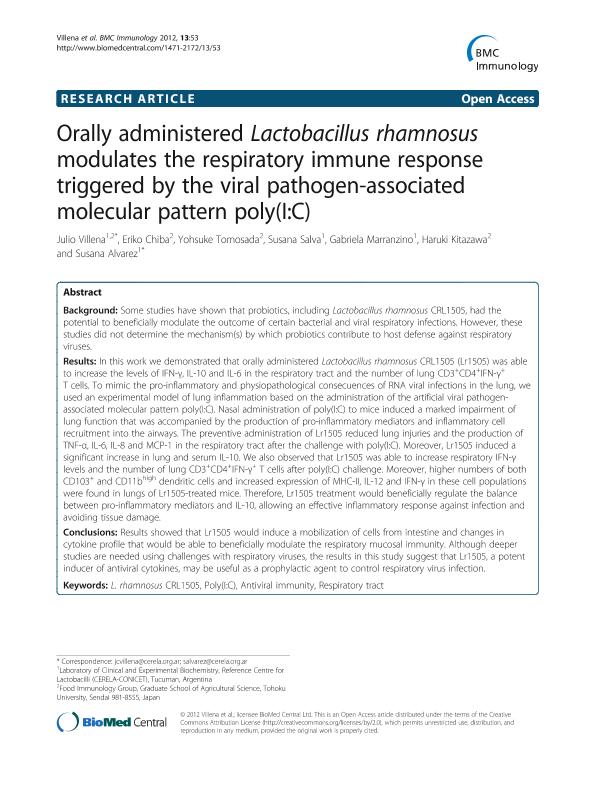Artículo
Orally administered Lactobacillus rhamnosus modulates the respiratory immune response triggered by the viral pathogen-associated molecular pattern poly(I:C)
Villena, Julio Cesar ; Chiba, Eriko; Tomosada, Yohsuke; Salva, Maria Susana
; Chiba, Eriko; Tomosada, Yohsuke; Salva, Maria Susana ; Marranzino, Gabriela
; Marranzino, Gabriela ; Kitazawa, Haruki; Alvarez, Gladis Susana
; Kitazawa, Haruki; Alvarez, Gladis Susana
 ; Chiba, Eriko; Tomosada, Yohsuke; Salva, Maria Susana
; Chiba, Eriko; Tomosada, Yohsuke; Salva, Maria Susana ; Marranzino, Gabriela
; Marranzino, Gabriela ; Kitazawa, Haruki; Alvarez, Gladis Susana
; Kitazawa, Haruki; Alvarez, Gladis Susana
Fecha de publicación:
09/2012
Editorial:
Biomed Central
Revista:
BMC Immunology
ISSN:
1471-2172
e-ISSN:
1471-2172
Idioma:
Inglés
Tipo de recurso:
Artículo publicado
Clasificación temática:
Resumen
Some studies have shown that probiotics, including Lactobacillus rhamnosus CRL1505, had the potential to beneficially modulate the outcome of certain bacterial and viral respiratory infections. However, these studies did not determine the mechanism(s) by which probiotics contribute to host defense against respiratory viruses. In this work we demonstrated that orally administered Lactobacillus rhamnosus CRL1505 (Lr1505) was able to increase the levels of IFN-γ, IL-10 and IL-6 in the respiratory tract and the number of lung CD3(+)CD4(+)IFN-γ(+) T cells. To mimic the pro-inflammatory and physiopathological consecuences of RNA viral infections in the lung, we used an experimental model of lung inflammation based on the administration of the artificial viral pathogen-associated molecular pattern poly(I:C). Nasal administration of poly(I:C) to mice induced a marked impairment of lung function that was accompanied by the production of pro-inflammatory mediators and inflammatory cell recruitment into the airways. The preventive administration of Lr1505 reduced lung injuries and the production of TNF-α, IL-6, IL-8 and MCP-1 in the respiratory tract after the challenge with poly(I:C). Moreover, Lr1505 induced a significant increase in lung and serum IL-10. We also observed that Lr1505 was able to increase respiratory IFN-γ levels and the number of lung CD3(+)CD4(+)IFN-γ(+) T cells after poly(I:C) challenge. Moreover, higher numbers of both CD103(+) and CD11b(high) dendritic cells and increased expression of MHC-II, IL-12 and IFN-γ in these cell populations were found in lungs of Lr1505-treated mice. Therefore, Lr1505 treatment would beneficially regulate the balance between pro-inflammatory mediators and IL-10, allowing an effective inflammatory response against infection and avoiding tissue damage. Results showed that Lr1505 would induce a mobilization of cells from intestine and changes in cytokine profile that would be able to beneficially modulate the respiratory mucosal immunity. Although deeper studies are needed using challenges with respiratory viruses, the results in this study suggest that Lr1505, a potent inducer of antiviral cytokines, may be useful as a prophylactic agent to control respiratory virus infection.
Palabras clave:
L. Rhamnosus Crl1505
,
Poli(I:C)
,
Antiviral Immunity
,
Respiratory Tract
Archivos asociados
Licencia
Identificadores
Colecciones
Articulos(CERELA)
Articulos de CENTRO DE REFERENCIA PARA LACTOBACILOS (I)
Articulos de CENTRO DE REFERENCIA PARA LACTOBACILOS (I)
Articulos(INQUINOA)
Articulos de INST.DE QUIMICA DEL NOROESTE
Articulos de INST.DE QUIMICA DEL NOROESTE
Citación
Villena, Julio Cesar; Chiba, Eriko; Tomosada, Yohsuke; Salva, Maria Susana; Marranzino, Gabriela; et al.; Orally administered Lactobacillus rhamnosus modulates the respiratory immune response triggered by the viral pathogen-associated molecular pattern poly(I:C); Biomed Central; BMC Immunology; 13; 53; 9-2012; 1-15
Compartir
Altmétricas



